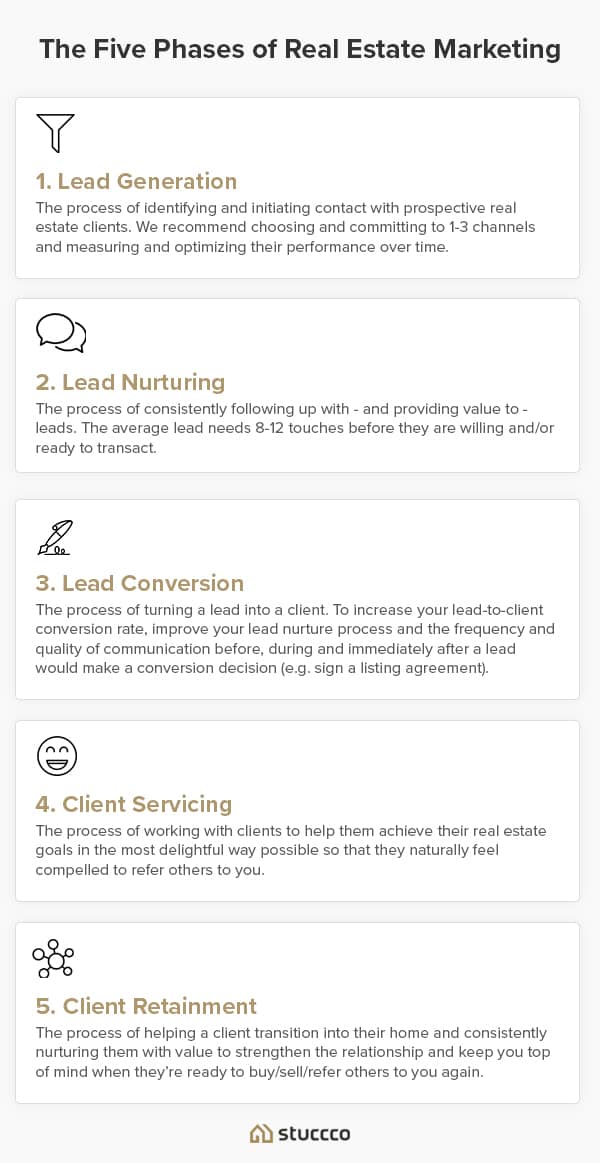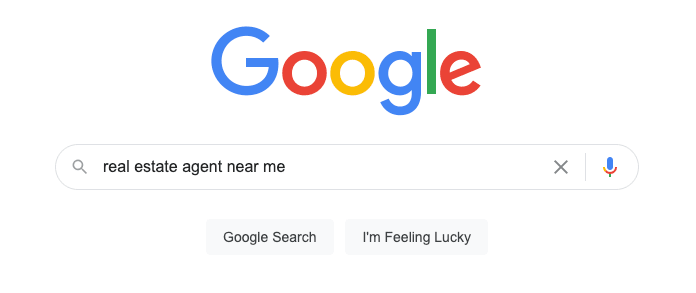Beginner’s Guide to Real Estate Marketing: Foolproof Tips & Ideas
In order to run a successful real estate business, you’ll need to be good at marketing (the action of promoting and selling services, including research and advertising).
If you’re unfamiliar with marketing, don’t worry. You don’t need a college degree, you don’t - and should never - need to be slimy or deceptive, and you don’t have to be a creative or technical genius to be good at it.
By reading this post, you’ll understand the basics of real estate marketing and get proven marketing ideas that you can use to help you consistently generate new real estate leads and sales without wasting your time or stressing you out.
Specifically, here’s what this guide covers:
- Real Estate Marketing Defined
- What Makes Real Estate Marketing Unique
- The Five Phases of Real Estate Marketing
- 5 Most Popular Real Estate Marketing Methods
- 21 Real Estate Marketing Ideas
- Frequently Asked Questions about Real Estate Marketing
What Makes Real Estate Marketing Unique
In the marketing world, real estate is unique. When you refer to residential real estate marketing, you could mean:
- Marketing to homeowners so they hire you to sell their house
- Marketing to renters or homeowners so they hire you to buy a house
- Marketing to home buyers so they buy your client’s house
In addition, marketing yourself as a real estate agent in Los Angeles will be different than marketing yourself in a small town in West Virginia. There’s no simple formula or marketing tactic that works across the board to find real estate clients or get great deals on your clients’ homes. Instead, the real estate marketing methods you choose will depend on your area, your market, your ideal clients and your preferences.
The Five Phases of Real Estate Marketing
Real estate agents don’t magically or immediately get new clients (if only it were that easy!). Rather, we must recognize that there is a universal and linear sequence to acquiring and retaining new business, which can be categorized into five phases: Lead Generation, Lead Nurturing, Lead Conversion, Client Servicing, Client Retainment.

1. Lead Generation
This is the process of identifying and initiating contact with prospective real estate clients. This is the most commonly discussed piece of the real estate marketing process, even though it’s only a small piece of the process. You can successfully generate real estate leads from any of the marketing methods listed below. Though all of the methods can work, we recommend choosing and committing to no more than three channels and measuring and optimizing their performance over time.
2. Lead Nurturing
Even if you have a long list of qualified leads, you can’t expect them to do business with you - especially if they don’t know you well. The average internet lead will not buy or sell a house for 6 to 18 months, and the average lead converts into a client after 8 to 12 touches. A lot of real estate agents fail at marketing because they only follow up with a lead once or a few times. To succeed in real estate marketing, you must adopt a long-term perspective and treat your leads like friends, constantly building trust through consistent service and communication.
Think about this from your lead’s perspective. They might be ready to buy or sell a home, but aren’t sure how to begin or which questions to ask. They may find you online and be open to working with you but get distracted and forget about you or their real estate-related goals as a result.
On the other hand, if you consistently nurture your leads by engaging with them and providing value (NOT bragging about you and your business), they’ll feel much more comfortable coming to you when they’re ready to buy or sell. And, if well-nurtured, the lead will be much more likely to convert, which brings us to phase three..
3. Lead Conversion
Converting a lead is when a lead becomes a real estate client (typically by signing a listing agreement). This is one of the most rewarding parts of real estate but getting new clients won’t happen without nailing down an effective and efficient method of generating leads and then nurturing those leads until they know, like and trust you and are motivated and able to buy or sell a house.
In order to convert your leads at a high rate, think about what you can do to build trust and offer value to them BEFORE and WHILE you speak with the lead in person or on the phone.
For example, to increase your lead-to-client conversion rate, you could:
- Email the lead an educational video preparing them for their upcoming appointment with you, giving them tips on how to interview an agent and what to look for in a good agent
- Email the lead a testimonial video from your past clients
- Mail the lead a package that includes a timeline and description of what it’s like to list their home with you
- Prepare a comparable market analysis and/or a local market report for the lead and review it with them during a listing appointment to help them feel more well-informed.
4. Client Servicing
This phase is all about working with clients to help them achieve their real estate goals in the most delightful way possible. The reason this is a phase of real estate marketing is because your goal should be to serve your clients so well that they’ll want to refer their friends and family to hire you too. Client referrals are free and have a high conversion rate because they come from trusted, experienced sources.
5. Client Retainment
Acquiring a new customer costs up to five times more than retaining an existing customer (source: Elasticpath.com). With this in mind, retaining clients is a vital phase of real estate marketing, especially if you have an existing book of business.
To help you retain clients, be sure to have:
- A post-sale follow-up process. We recommend calling clients 1 day, 1 week and 1 month after a transaction to check in and make sure they have transitioned into the home seamlessly. Or, if they are facing any challenges, you’ll be there to help them navigate it.
- Client Nurturing. Send valuable content (emails, mailers, invitations, news, insights, etc.) on a regular basis.
Doing these two things will help your clients feel reassured about their purchases and keep you top of mind and connected with them. When they’re ready to buy or sell a home again - or refer someone else who is ready to do so - they’ll be more likely to think of you.
5 Most Popular Real Estate Marketing Methods
There are an endless number of ways you can market yourself as a real estate agent and market your listings, and you’ll find new methods as you continue to gain experience and confidence. In general, real estate marketing is done through one of these five channels:
1. Advertising
Using real estate advertising (paid promotional campaigns) is one of the most common and predictable methods of generating new business. For decades, real estate agents have invested in running advertising campaigns in what are now oftentimes referred to as “traditional” channels to generate new leads and clients. Examples of traditional advertising channels include radio, television, and print ads such as those found in mail, magazines, newspaper classifieds and on billboards.
However, the world of real estate advertising has changed significantly and quickly. In 2019, traditional advertising channels were overtaken by digital advertising channels - such as Google, Facebook, Instagram, Zillow - in total ad spend. According to emarketer.com, it is estimated that US advertisers will spend $104 billion on traditional advertising and a whopping $172 billion on digital advertising.
While both forms of advertising can produce a positive return on investment, digital advertising tends to be faster to make use of and offers more targeting options, reporting and tracking features. Although there is a learning curve to making use of digital advertising, it can quickly generate qualified real estate leads for those who know how to properly set up and manage digital advertising campaigns. With the right ad strategy, images and messaging, you’ll be able to minimize your marketing efforts and maximize your results.
For example, Facebook Lead Ads can generate qualified leads and targeted web traffic to landing pages for your listings. To maximize the performance of your ads and landing pages (and therefore the campaign as a whole), you should use and test virtually staged photos of your listing in the ads and on the landing page. The image that an ad uses is the single most important part of a high quality ad. In order to get the highest return on your investment in your paid ads you should A/B test multiple images of the property. Once you’ve gathered enough data on how the ad is performing, you should continue to show the best-performing photo in the ad, which is usually a virtually staged photo of the home’s exterior or primary living room or kitchen.

Example of exterior virtual staging by Stuccco
2. Social Media
The most popular social media platforms for real estate are Facebook (used by a whopping 97% of real estate agents), YouTube, Instagram, Twitter, and LinkedIn. However, it’s extremely important to note that you do not need to be on every social media platform - in fact, we recommend that you choose one or two platforms that you can consistently publish valuable content and engage with your sphere on.
Many real estate agents don’t think highly of social media, and unfortunately, that comes across in their posts and engagement. You won’t get results from social media if you spread yourself too thin or only post content to check a box off your to-do list.
One of the great things about using social media, besides the powerful reach it gives you, is that, with the many platforms that are now available to us, you can find a platform that resonates with you. If you’re just getting started with social media, give yourself the freedom to create different social media accounts, learn which platform(s) you prefer and then stick with it.
- To help you come up with new content ideas, we recommend using a service like Coffee and Contracts.
- To help you create beautiful content, we recommend using tools like Canva or Photoshop.
- To help you plan and schedule posts, we recommend using a tool like Publer.
3. Networking
Networking is still one of the most effective marketing strategies in the real estate industry. Although it can seem intimidating, networking is not actually about selling. It’s about being known as a trusted real estate expert so your contacts want to refer their contacts to you. Think about building relationships with your neighbors, friends, and local businesses. The bigger and stronger your network, the more referrals you’ll receive.
If you’re looking for a more formal means of networking, you may want to consider joining a professional networking group that meets regularly such as Business Networking International. One of the many benefits of these groups is that anyone who participates in them understands that its purpose is to get its members to generate leads for one another. In other words, everyone’s goals are known and in alignment. Each group or chapter typically doesn’t accept more than one participating real estate agent, which means that if you’re accepted, you won’t be competing for real estate referrals.
In a small experiment done by RIS Media, a team of 14 agents networked for a full month with everyone they came in contact with. At the end of the month, the team had set 309 appointments - a 100-200% increase in leads. No matter what kind of marketing strategy you choose, networking should be part of it.
4. Email Marketing
Email marketing can be a fast, easy, and effective way to nurture potential clients and keep in touch with past clients. It’s a simple concept; start by gathering email addresses from your friends, past clients, real estate website or social media profiles. You can encourage your contacts and new leads to sign up for your email list by offering something of value to them like a free home valuation or CMA (comparative market analysis).
You can collect email addresses and send email newsletters to subscribers using an email marketing tool like Mailchimp or, ideally, using your real estate CRM if it offers this functionality (most goods ones do). Email newsletters can include (but are certainly not limited to):
- Local real estate market updates
- Home maintenance tips
- Upcoming open houses
- Neighborhood news (such as a restaurant review, fun event, etc.)
- Well-wishes (birthdays, holidays, promotions, etc.)
Include links to your social media accounts in the footer of your email newsletters to ensure recipients can follow you elsewhere online.
5. SEO (Search Engine Optimization)
Home buyers in your area are searching for real estate agents on search engines like Google and Bing. Learning SEO is one of the most complex and technical real estate marketing strategies, but it can also provide you with a high ROI (return on investment). You’ll need to optimize the front and back ends of your real estate website for certain keywords and keyword phrases like, “Real estate agent Albuquerque” or, “Houses for sale in Raleigh.” SEO takes time and consistent effort before you’ll see results; however, when you do rank for common search keyword phrases, you won’t be at the mercy of paying for traffic and the traffic you do receive will convert higher than paid traffic.

Note: If you want your website to appear in search results, but don’t want to spend the time and effort on blog posts, technical optimization, and learning how to rank organically, then you’ll want to make use of paid search ads such as Google Adwords or Bing Search Ads. You can target specific keywords and pay per click.
21 Real Estate Marketing Ideas
Choosing the best real estate marketing idea is very subjective; what works extremely well for one agent won’t necessarily work for the next. Plus, some marketing campaigns should promote yourself, some should promote your listings and some should be educational and/or entertaining. Keep this in mind while scanning some of these unique real estate marketing ideas below:
- Show behind the scenes pictures and videos on Facebook and Instagram Stories
- Support new and existing local businesses by sharing them with your audience on social media, email, or your website
- Complete your Google My Business profile to show up in searches
- Use single property websites to maximize traffic to your listings
- Go live on Facebook, Instagram or TikTok
- Write emails with local market updates
- Produce drone videos and/or photos showcasing the local market from above
- Use IDX on your website to allow visitors to search for homes
- Create a valuable lead magnet for your website
- Create first time home buyer video trainings
- Create funny real estate related memes or GIFs to get more social media shares
- Become a guest on podcasts that your ideal target customer is listening to
- Write a guest article on a website or in a newsletter that your ideal customer reads
- Create referral partnerships with local lenders, designers and even furniture companies
- Post before and after images of home transformations
- Share details about different features in various neighborhoods
- Run Facebook ads to share your upcoming open houses and listing photos
- Use Zillow or Realtor.com advertising to generate leads
- Create video walkthroughs of your listings
- Publish a blog post about your personal experiences or client victories
- Make YouTube videos about how to prepare for homeownership or take care of your home
- Virtually stage photos of your listings and share them with others on social media and email
One of the best ways to market your listings and showcase your thought leadership and tech-savviness as an agent is by using virtual staging. Staged homes sell 87% faster and for more money but you don’t have to spend thousands of dollars and force your clients to move out of their homes with traditional staging to get those benefits.
Frequently Asked Questions About Real Estate Marketing
What is a real estate lead?
A real estate lead is a potential real estate client. To be a lead, they should have expressed an interest in buying or selling a home and granted you permission to communicate with them. You can generate real estate leads from a variety of sources documented above such as from your website, social media, friends, family members, etc.
Why is real estate marketing important?
Successful businesses don’t sit around and wait for customers to come to them. Your real estate marketing efforts will directly impact the number and quality of clients you serve. Real estate marketing is a key component of running any steady and successful real estate business.
What's the core of successful real estate marketing?
The best and most successful real estate marketing campaigns are both strategic and genuine. As a real estate agent, you have the tools, knowledge, and network to help people in your local area find a new home or sell their home. Make it easy to market yourself and your listings by focusing on the marketing platforms and methods that you enjoy. Always remember that people are always asking, “What’s in it for me?” Your messaging should always be focused on relating to and helping your audience solve their problems.
How do I get real estate clients?
Home buyers and sellers will choose real estate agents who they trust and believe can help them. So, in order to get more clients, you need to strategically put yourself in front of potential clients and show your trustworthiness, experience, and expertise on a consistent basis.
Are your ideal clients scrolling on social media, or checking their email more frequently? Be active where they are. No matter what method or platform you use to market yourself, you’ll get more clients by being consistent and genuine.



